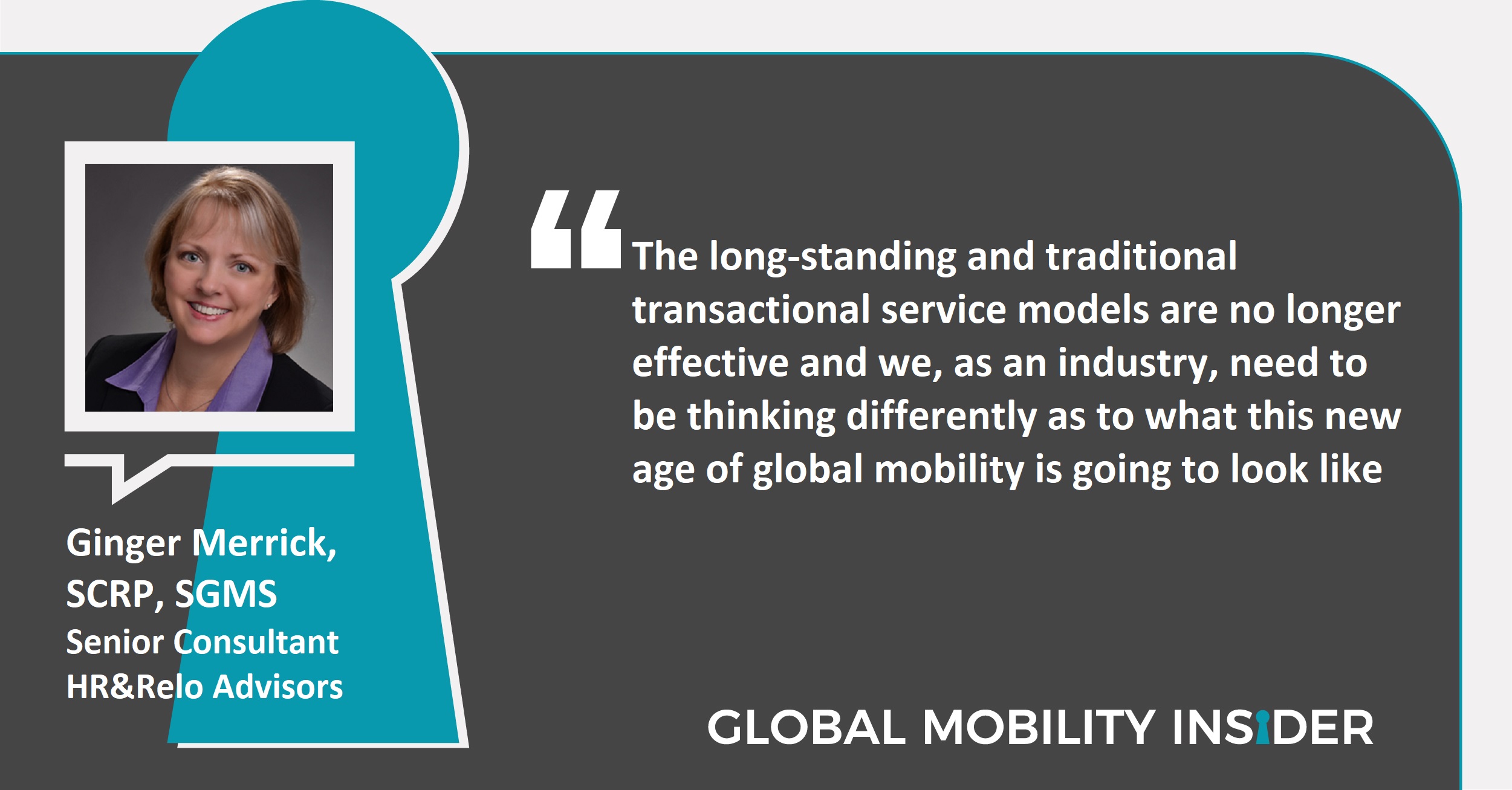Ginger Merrick, SCRP, SGMS - Senior Consultant - HR&Relo Advisors
Name: Ginger Merrick, SCRP, SGMS
Position: Senior Consultant
Company: HR&Relo Advisors

Professional Background
HR&Relo Advisors, Senior Consultant (United States): 2015 – Present
The Coca-Cola Company, Global Mobility Manager (United States): 2010 – 2014
Coca-Cola Enterprises, Global Mobility Manager (United States): 2001 – 2010
Coca-Cola Enterprises, HR, Treasury & Investor Relations roles (United States): 1991 – 2001
Career Insider
Q: What is 'business as usual' like for you at HR&Relo Advisors?
A: Everyday brings a mix of activities and areas of focus. One part of the day I could be working on a consulting project, proposal or doing research and then I switch to a business development or client service focus. Having spent the last two decades on the corporate-side of the global mobility industry, I approach prospective clients as I would have liked. I understand the demands on their time and how shifting priorities can impact mobility projects. In my opinion, it is critical that the corporate clients know you understand them, their challenges and your goal is to find the right answer for their company and culture, whatever that looks like. Since we are independent consultants, we bring a 360-degree perspective to each project and are knowledgeable of available industry services and market-based practices but are not influenced by any.
HR&Relo Advisors offers relocation and global mobility consulting services most commonly on a project basis. We are part of the internal team and expected to bring industry expertise, and objectivity to expedite decision making and reduce project time. This is one the three brands of Employee HomeView LLC (EHV), the parent company. EHV is a small, Ohio-based, woman-owned business, formed in 2010 by Renita Charrlin, Owner and CEO. The consulting team members are based in Cleveland, Atlanta, Denver, Jacksonville, Richmond, Nashville, San Francisco and Singapore.
Click & Like on LinkedIn
Q: What at HR&Relo Advisors keeps you going to work every day?
A: There is such an opportunity to help others, not just the corporate global mobility managers, but the people who are relocating and going on assignments. Mobility is complex and in today’s world of daily changes to immigration, tax and shrinking budgets, being able to help people navigate this world is exciting and very rewarding. To assist our clients in their ability to manage stakeholder expectations and become more strategic and less transactional, is very rewarding.
Q: What advice would you give to someone looking to build a career in global mobility?
A: I recommend a mindset that is willing and open to diverse ideas, multiple solution options and to enjoy constantly learning. Be curious, take initiative, talk to people, learn from others and have confidence that if you do not know something, you do know how to go about figuring it out and have developed resources. I have found that the people in the relocation and global mobility industry on the client and service sides care about people and they have a deep sense of empathy for others. If this sounds like you, then global mobility is probably going to be a good fit.
Industry Insider
Q: How do you think the global mobility industry has changed over the years?
A: The global mobility industry has had to keep up with changes in technology, for individuals and governments. The impact of mergers and acquisitions can be seen on both the client and service side of the industry. When it comes to global organizations, the need for keen attention to risk management and compliance for tax, immigration and data security has only grown in importance.
Q: What do you think is the primary thing hindering the global mobility industry's progress?
A: Companies wanting yesterday’s high-level/high-touch support and today’s technology at a lower cost.
Q: What kind of tech or software would you suggest for global mobility processing?
A: Core technology should be web-based client/transferee portals and ability to communicate via mobile phones. Many transferees prefer using text messaging more than email and this needs to be an option.
Visionary Insider
Q: How well do you think issues surrounding diversity and inclusion are handled in the global mobility sector? What could be done better?
A: Diversity and inclusion initiatives need to be beyond race and gender, they need to make sure that if someone is the only foreign worker on a team, their perspective is considered. Depending on the company and the individual’s culture, there needs to be some level of cultural awareness training, so people can more effectively communicate and appreciate the other’s perspective. Relative to gender, women make up about 40% of the global workforce, but only 15% - 20% of international assignees are women. Women understand that international experience is a key factor for their career development, but companies need to continue to remove barriers that prevent women from raising their hand or being tapped.
Q: What more can be done to improve current global mobility practices to benefit talent on the move?
A: Companies need to start earlier in making their talent aware of and preparing them to be mobile and also for the company to also access their mobility knowledge and agility. This should start with employee profile. A few examples of data to be captured: How many times have you been transferred in your career? Are you willing to relocate to a new location? If so, what cities and countries would you consider? What cities and countries would you not consider? If not willing to relocate, would you consider a short-term (less than 1 year) assignment? Or a long-term assignment? (1 – 3 years). What languages do you speak fluently? Are there other languages you would like to or be willing to learn/become more fluent in? What countries have you traveled to for business or personal reasons? Describe any cultural and/or diversity training you have had during your career.
To support and follow-up on this, companies should review their training. Does it include basic training on culture, diversity, relocation 101, international assignments 101, at all levels and more advanced and mandatory at the manager level? And, lastly, management and employee discussions of career development, growth and opportunity should include all of these components. Considering a healthy corporate culture that embraces and trains on culture, diversity and mobility sets the stage in all of these areas help to support and build a more agile, mobile workforce and global mindset.
Q: What are the major developments you currently see happening in the industry, and how do you feel about them?
A: Global mobility is evolving quickly to not only include workers being relocated but to be much more expansive. Today global mobility includes (or should) include business travellers, short-term assignments, commuters, etc. With each of these comes different challenges from compliance, tracking, management, and career pathing. And over-riding all of this remains the corporate and service provider’s task of cost containment or reduction. The long-standing and traditional transactional service models are no longer effective and we, as an industry, need to be thinking differently as to what this new age of global mobility is going to look like, and how are we going to adapt and improve.
Either/Or…
- Short-term or long-term assignment? Short-term assignments
- Airbnb or serviced apartments? Serviced Apartments
- Excel or global mobility software? Global Mobility Software
- Lump-sum or flex-ben? Flex-Benefits
- Facebook or LinkedIn? LinkedIn
- Outlook or Gmail? Outlook
- Taxi or Uber? Uber
- iOS or Android? iOS
- Mac or PC? PC
- Computer or tablet? Computer
- Work hard or play hard? Both


Leave a Comment
* Fields marked with this asterisk are mandatory.